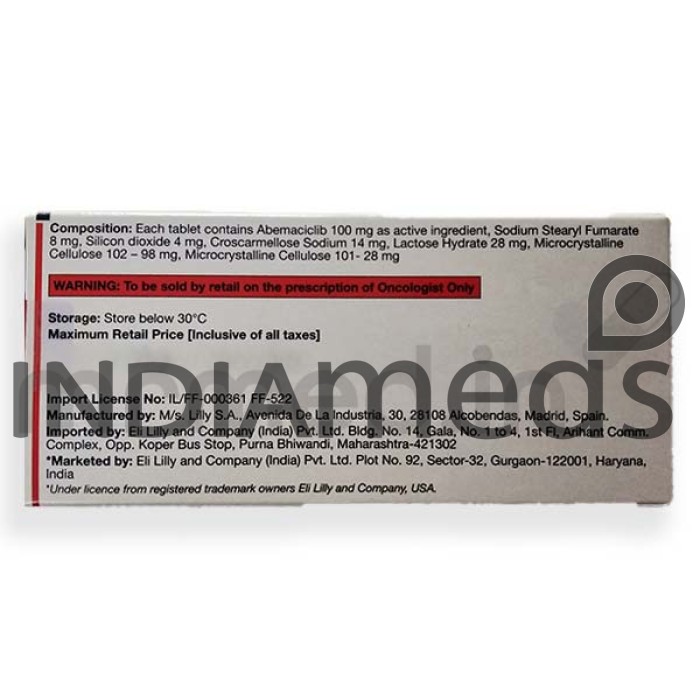Ramiven 100mg Tablet is an anticancer medication containing the active ingredient Abemaciclib. It is used to treat certain types of breast cancer (hormone receptor-positive, HER2 negative breast cancer) that are advanced or metastatic (breast cancer that has spread to other parts of the body). Cancer is a condition in which cells multiply in an uncontrolled and abnormal manner. This medication works by inhibiting the proteins called cyclin-dependent kinases that play a significant role in the rapid multiplication of cancer cells. This medicine is intended for oral use only and it is given in combination with other hormonal medications. Ramiven 100mg Tablet is not recommended for adolescents and children under 18 years of age. Before taking this medicine, it is vital to inform your doctor if you have any signs of infections (fever, chills, or sore throat), liver or kidney disorders.
Consult your doctor if you are pregnant or planning for pregnancy in the near future as Ramiven 100mg Tablet may impact your fetus. If you are in getting this treatment during the childbearing age, discuss with your doctor regarding the use of effective birth control methods during the treatment and for at least three weeks after the last dose. This medicine may cause fertility problems in men. You must not eat grapefruits or drink grapefruit juice during the treatment with Ramiven 100mg Tablet. Inform your physician of all the medicines, including supplements and herbal medicines, you are taking before you start treatment with this medication to avoid serious side effects. Report to your doctor if you have had a history of intolerance to any forms of sugar.
Therapeutic Effects of Ramiven 100mg Tablet
Pregnancy
Ramiven 100mg Tablet is unsafe for pregnant women as it may cause foetal harm. It can cause damage to a developing baby if taken during pregnancy.
Breast Feeding
Ramiven 100mg Tablet is not recommended during breastfeeding, as it is excreted in human milk. Because of the potential risk to the infant, breastfeeding is not recommended during treatment.
Lungs
Ramiven 100mg Tablet has been associated with some lung-related side effects, although these are relatively uncommon. Inform your doctor if you have any lung diseases before starting the treatment.
Liver
Regular monitoring of liver function tests is recommended because Ramiven 100mg Tablet has been associated with liver injury in some patients. It is important to monitor liver function regularly in patients, particularly in those with pre-existing liver disease or a history of liver problems.
Alcohol
It is generally recommended that patients taking Ramiven 100 mg Tablet should avoid or limit their alcohol intake, as alcohol can increase the risk of liver damage and exacerbate any liver-related side effects.
Driving
Ramiven 100mg Tablet may cause side effects such as fatigue, dizziness, or blurred vision that can impair a patient's ability to drive or operate machinery safely. If a patient experiences any side effects that affect their ability to drive or operate machinery safely while taking, they should avoid these activities and seek medical advice.
Serious:
- Dehydration
- Kidney problem
- Electrolyte imbalances
- Liver damage
- Dark urine
- Abdominal pain
- Pneumonitis
- Interstitial lung disease
- Chest pain
Common:
- Diarrhoea
- Nausea
- Vomiting
- Fatigue
- Decreased appetite
- Abdominal pain
- Headache
- Respiratory tract infections
- Anaemia
- Increased risk of infections
- Low white blood cell count
- Low platelet count
Ramiven 100mg is used to treat certain types of cancer, including advanced or metastatic breast cancer, advanced or metastatic non-small cell lung cancer, advanced or metastatic hormone receptor-positive, HER2-negative endometrial cancer, and high-risk neuroblastoma in pediatric patients.
Ramiven 100mg Tablet is typically taken orally, with or without food, as prescribed by a healthcare provider. The tablets should be swallowed whole with a glass of water and not crushed, chewed or broken.
Common side effects of Ramiven 100mg may include diarrhea, nausea, vomiting, fatigue, decreased appetite, abdominal pain, headache, and low white blood cell count. Less common but more serious side effects may include liver problems, blood clots, and pulmonary embolism.
Ramiven 100mg Tablet should not be used during pregnancy unless necessary and the potential benefits outweigh the potential risks to the fetus. Women of childbearing age should use effective contraception while taking it and for at least three weeks after the last dose.
The length of treatment with Ramiven 100mg Tablet will depend on a variety of factors, including the type and stage of cancer being treated, how well the medication is tolerated, and the patient's response to treatment.
Ramiven 100mg Tablet may interact with other medications, so it's important to inform your healthcare provider about all medications, supplements, and herbal products you are taking.
Molecule name: Abemaciclib | Therapeutic class: Anticancer |
Pharmacological class: Alkylating agents | Indications: 1. Advanced or metastatic breast cancer. 2. Advanced or metastatic non-small cell lung cancer. 3. Advanced or metastatic endometrial cancer. 4. Pediatric patients with neuroblastoma. |





